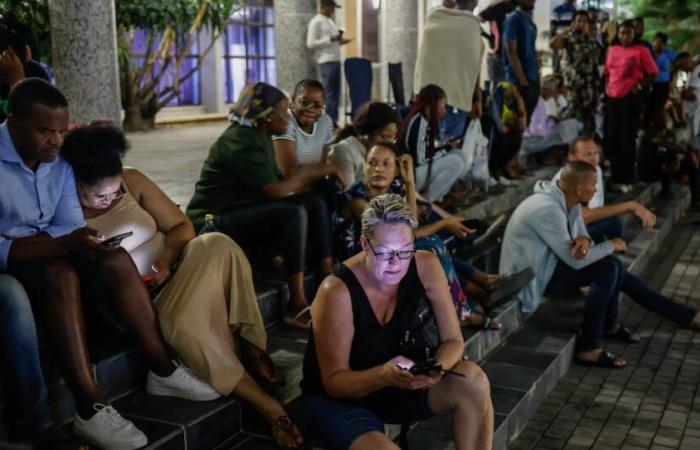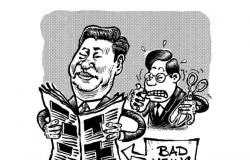“In several offices, we were still voting this morning,” a spokesperson for the electoral commission, Siluka De Wet, told AFP, unable to confirm whether operations had ceased at 8:00 a.m. local time (6:00 a.m. GMT).
At the University of Science and Technology in the capital Windhoek, voting operations did not end until 5:00 a.m., members of the polling station told AFP, having started counting, despite the sleepless night. The hundred or so blue chairs stacked in the courtyard bear witness to the crowds until late.
Is this an indication of high participation which would be a bad signal for Swapo, the party in power since independence in 1990, more challenged than ever? Its candidate Netumbo Nandi-Ndaitwah, in a position to become the first female president of this southern African country, could be forced into an unprecedented second round.
In the polling station at the town hall of the capital, Windhoek, as in countless others in the country, operations were suspended for a moment the day before for lack of ballots.
After an hour’s break, applause to greet the arrival of the blocks of paper woke up the voters dozing while seated at 11:30 p.m. The last voter voted there four and a half hours after the office closed.
“It’s heartbreaking to wait for hours and hours for there to be failures like a shortage of ballots. The voters came, but the electoral commission betrayed us,” lamented Reagan Cooper, a 43-year-old farmer among the hundred castaways of the night in front of city hall.
Read also: Namibia votes, the historic ruling party threatened
Armed with patience, folding chairs and umbrellas to overcome lines moving at a pachyderm’s pace, Namibians sometimes waited up to twelve hours, under a blazing sun before being able to vote.
Tablets used to verify identities using fingerprints also experienced breakdowns in several offices.
The Independent Patriots Party (IPC), the main opposition party, accused the electoral commission of “deliberately trying to dissuade voters from voting”, through its general secretary Christine Aochamus.
Massive unemployment, gaping inequalities
Faced with criticism from all parties – Swapo included – the commission decided to extend the vote “without specified duration”, indicated its head for the Windhoek region Rakondjerua Kavari.
The Swapo Netumbo candidate Nandi-Ndaitwah (“NNN”), 72 years old in the struggle for liberation, had called on the 1.5 million registered voters to “vote in numbers” when casting their ballot from the opening.
“NNN” faces competition from ex-dentist and lawyer Panduleni Itula, 67, who founded his own party, the Independent Patriots Party, in 2020. Without training to rely on in 2019, he then gathered 29.4% of the votes.
Massive unemployment, persistent inequalities and generational renewal have eroded support for Swapo in this desert territory of southern Africa which is among the world’s leading suppliers of uranium.
Read also: In southern Africa, disengagement hits the historic parties in power
“My father was a liberation hero. I won’t abandon Swapo, it’s my family. But I want it to be challenged,” says Marvyn Pescha, a 50-year-old self-employed person from Katutura, the main township of Windhoek. “Certain opportunist leaders have tarnished the reputation of the party by using it for personal enrichment,” he regrets.
A second round of presidential elections is for the first time a “fairly realistic option”, according to Henning Melber, researcher at the Nordic Africa Institute in Uppsala (Sweden).
After immortalizing her first experience as a voter by photographing her thumb blued by indelible ink, Sophia Varela, 24, confides that she “hopes for change” and “work for young people”, so numerous in this country where more than 60% of the population is under 30 years old.
At the end of three decades of rule by Swapo, a Marxist-inspired movement from the time of the struggle against the occupation of apartheid South Africa, Namibia remains, according to the World Bank, the second largest country most unequal on the planet, after South Africa.
“The abundant mining activity does not really translate” into “employment opportunities,” observes independent analyst Marisa Lourenço. In 2018, the year of the latest figures released, 46% of 18-34 year olds were unemployed.
Swapo, which fought for the country’s independence, may fear the same fate as its sister liberation parties in the region, weakened like the ANC in South Africa or swept aside like the BDP in Botswana.
Par Le360 Africa (with AFP)
11/28/2024 at 8:22 a.m.






